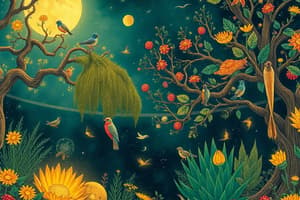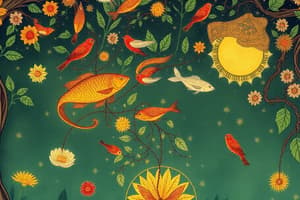Podcast
Questions and Answers
What are food chains?
What are food chains?
Food chains show which organisms eat other organisms.
What are arrows used for in food chains?
What are arrows used for in food chains?
The arrows represent the direction of the transfer of energy from one organism to the next.
Name a food chain.
Name a food chain.
Grass ---> rabbit ---> fox
What's a producer?
What's a producer?
What's a consumer?
What's a consumer?
Describe a food chain.
Describe a food chain.
What is a herbivore?
What is a herbivore?
What is a carnivore?
What is a carnivore?
What is an omnivore?
What is an omnivore?
What is prey?
What is prey?
What is a predator?
What is a predator?
What is a food web?
What is a food web?
What would happen if an organism was to be taken out of a food web?
What would happen if an organism was to be taken out of a food web?
What is energy transfer in a food web?
What is energy transfer in a food web?
How much energy is passed on and lost?
How much energy is passed on and lost?
How is the 90% of energy lost?
How is the 90% of energy lost?
Name the three types of pyramids in ecosystems.
Name the three types of pyramids in ecosystems.
What are pyramids of numbers?
What are pyramids of numbers?
What is a pyramid of biomass?
What is a pyramid of biomass?
What is a pyramid of energy?
What is a pyramid of energy?
What is the source of energy in all ecosystems?
What is the source of energy in all ecosystems?
What's a decomposer?
What's a decomposer?
Flashcards are hidden until you start studying
Study Notes
Food Chains and Food Webs
- Food chains illustrate the sequence of who eats whom in an ecosystem, highlighting energy transfer between organisms.
- Arrows in food chains indicate the direction of energy flow, emphasizing the transfer of energy from one organism to another.
- An example of a simple food chain: Grass → Rabbit → Fox.
Producers and Consumers
- Producers, such as green plants, create their own food via photosynthesis, transforming light energy into chemical energy.
- Consumers are organisms that must consume other organisms to gain energy; they rely on other life forms for sustenance.
Types of Consumers
- Herbivores consume only plant material.
- Carnivores feed exclusively on animal matter.
- Omnivores eat both plants and animals.
Predation Concepts
- Prey refers to animals that are hunted and killed by predators.
- Predators are animals that hunt and kill other animals for food.
Food Webs
- Food webs demonstrate the interconnectedness of multiple food chains within an ecosystem, showing dependencies among organisms.
- Removing an organism from a food web impacts population dynamics: its prey may increase, while its predators may decrease.
Energy Transfer in Ecosystems
- Energy is stored at each link in a food web and transforms through various stages.
- Only 10% of energy is transferred to the next trophic level; 90% is lost, mainly as heat, movement, and undigested materials.
Pyramids of Energy, Biomass, and Numbers
- Three types of ecological pyramids:
- Pyramids of numbers show the quantity of organisms at each trophic level, typically increasing as one moves up the food chain, though exceptions exist (e.g., one tree serving many caterpillars).
- Pyramids of biomass indicate the total mass of organisms at each level. Although some producers can grow rapidly, this doesn't always reflect true biomass at a given moment.
- Pyramids of energy accurately display the energy available at each level over time, producing a consistently true pyramid shape.
Sources of Ecosystem Energy
- Light energy from the sun acts as the primary energy source for all ecosystems.
Decomposers
- Decomposers break down dead organic matter and waste, recycling nutrients back into the ecosystem, and play a critical role in nutrient cycling.
Studying That Suits You
Use AI to generate personalized quizzes and flashcards to suit your learning preferences.




